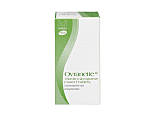Ovranette
Low-dose Contraceptive Pill With Levonorgestrel and Ethinylestradiol


Ovranette is a contraceptive pill containing the active ingredients levonorgestrel and ethinylestradiol, used to prevent pregnancy in women. To place a prescription order for contraception, fill in our short online questionnaire. There, you can choose a preferred treatment, such as Ovranette or Microlite.
One of our doctors will check if the contraception is suitable for you and issue your prescription to a local pharmacy in Ireland or your home address. A consultation for contraception prescription costs €21.50.



About Ovranette
-
-
Ovranette is a contraceptive pill used to prevent pregnancy. It is a ‘combined’ oral contraceptive pill containing synthetic versions of the 2 sex hormones produced naturally by the female body (oestrogen and progestogen).
As a low-dose contraceptive pill Ovranette is suitable for women who experience side effects relating to the high oestrogen content in other pills.
When taken correctly, Ovranette is over 99% effective at preventing pregnancy in women.
Ovranette is taken every day for 21 days in a row, at around the same time every day. After 21 days, there is a 7-day ‘break’ when you do not take any pills. During this time, your body will produce a ‘withdrawal’ bleed similar to your natural monthly period.
-
-
Ovranette is a prescription medication taken by sexually active women as a form of contraception to prevent pregnancy.
You should not take Ovranette if you:
- are or suspect you may be pregnant
- are allergic to any of the listed ingredients
- have had a blood clot (thrombosis in the leg, or embolus in the lung)
- have unexplained vaginal bleeding
- have (or have had) breast or ovarian cancer
- have high blood pressure
- have heart problems (like irregular heartbeats)
- have migraines which disturb your vision or with other associated symptoms
- have systemic lupus erythematosus (SLE) disease
- have not yet started to have monthly periods
-
-
You should swallow 1 Ovranette pill per day, with or without food or water. Always follow the directions your prescribing nurse, pharmacist or doctor has given you for using Ovranette.
Each Ovranette packet contains 21 pills, each marked on the packet by the days of the week. Take 1 Ovranette pill every day for 21 days in a row, matching the days of the week marked on the packet. For example, if you start your packet on a Monday, press your first pill through ‘MON’. Try to remember to take your pill at around the same time every day.
After taking the pill for 21 days, you should have a 7-day ‘break’ period. During this time, you should not take any pills, and you should experience a ‘withdrawal’ bleed like your monthly period, but it is usually lighter and less unpleasant. After the 7-day pill ‘break’, start a new pill packet, and repeat the process.
-
-
If you have not taken any form of hormonal contraception in the month before starting Ovranette, take your first pill on the first day of your next period to have complete protection from pregnancy. If you start on any other day of your period, you should use an additional contraceptive method for the first 7 days.
If you are changing to Ovranette from another form of hormonal contraception:
- From a combined pill: You can start taking Ovranette immediately. Consult the product literature for requirements of specific preparations.
From progesterone-only pill (mini pill): You can stop any day and start Ovranette the next day but use additional contraception (like condoms) for the first 7 days of Ovranette use.
-
-
If you have forgotten or otherwise missed a pill it is important to determine how much time has passed since you should have taken Ovranette:
- It has been less than 24 hours: In this case you take the pill as soon as you remember and afterwards continue with your usual regimen. You will still be protected.
- It has been 24 hours or more: Take your forgotten pill as well as your regular pill, even if that means taking 2 pills at the same time. For the next 7 days you should use an additional barrier method (like condoms) in order to still be protected. It might also make sense to speak with your doctor or pharmacist as you may need emergency contraception, like the morning after pill or a copper intrauterine device (copper IUD).
For further information always read your package leaflet.
-
-
The active ingredients in Ovranette pills are 150 mcg levonorgestrel, and 30 mcg ethinylestradiol.
The other ingredients in Ovranette are lactose, maize starch, talc, povidone, polyethylene glycol, magnesium stearate, calcium carbonate, sucrose, white wax, and wax carnauba.
-
-
Like with all medicines, there is a possibility of side effects when taking Ovranette.
Common side effects of taking Ovranette include:
- headaches
- spotting or breakthrough bleeding
- thrush or other vaginal infections
- nausea or vomiting
- stomach pain or cramps
- changes in weight
- mood imbalance (including anxiety and depression)
- feeling dizzy
- changes in sex drive (libido)
- spots or acne
- painful or tender breasts
- breast enlargement or secretion
Uncommon side effects of taking Ovranette include:
- upset stomach or diarrhoea
- skin rash
- changes in appetite
- changes to usual menstrual flow
- chloasma (brown patches on the skin)
- urticaria (hives)
- raised blood pressure
See a doctor immediately if you experience:
- signs of an allergic reaction (breathing problems, swelling of lips, face, throat or tongue)
- signs of a blood clot (sudden chest pain, difficulty breathing, or a painful swelling in your leg)
- signs of a stroke or heart attack (sudden chest pain which can extend down the left arm, blurred vision, difficulty talking, sudden numbness or weakness down one side of the body, fainting or seizures)
If you have a question about this service, please email info@zavamed.com with the question, and one of our doctors will get back to you within 24 hours.

Babak studied medicine at King’s College London and graduated in 2003, having also gained a bachelor’s degree in Physiology during his time there. He completed his general practice (GP) training in East London, where he worked for a number of years as a partner at a large inner-city GP practice. He completed the Royal College of GPs membership exam in 2007.
Meet our doctorsLast reviewed: 06 Jun 2023
